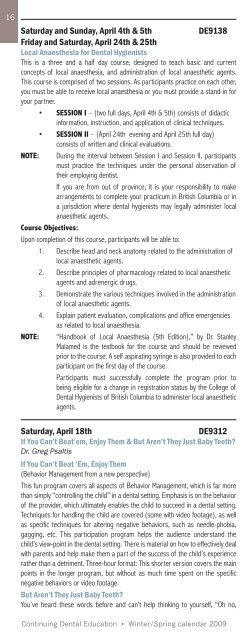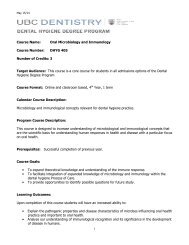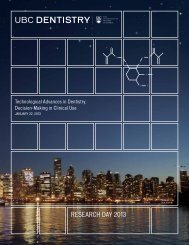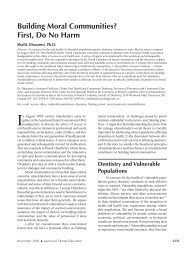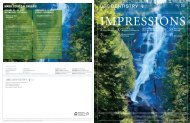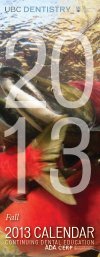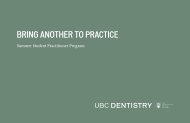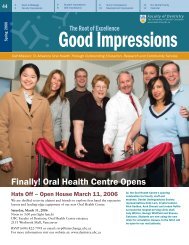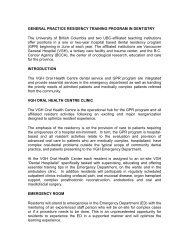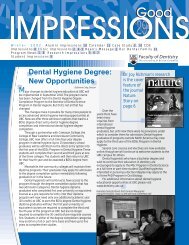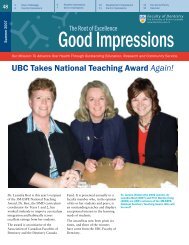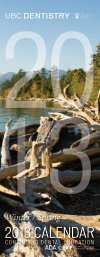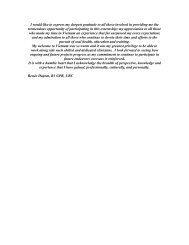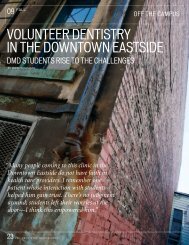January - UBC Dentistry - University of British Columbia
January - UBC Dentistry - University of British Columbia
January - UBC Dentistry - University of British Columbia
Create successful ePaper yourself
Turn your PDF publications into a flip-book with our unique Google optimized e-Paper software.
16<br />
Saturday and Sunday, April 4th & 5th<br />
DE9138<br />
Friday and Saturday, April 24th & 25th<br />
Local Anaesthesia for Dental Hygienists<br />
This is a three and a half day course, designed to teach basic and current<br />
concepts <strong>of</strong> local anaesthesia, and administration <strong>of</strong> local anaesthetic agents.<br />
This course is comprised <strong>of</strong> two sessions. As participants practice on each other,<br />
you must be able to receive local anaesthesia or you must provide a stand-in for<br />
your partner.<br />
SESSION I – (two full days, April 4th & 5th) consists <strong>of</strong> didactic<br />
information, instruction, and application <strong>of</strong> clinical techniques.<br />
SESSION II – (April 24th evening and April 25th full day)<br />
consists <strong>of</strong> written and clinical evaluations.<br />
NOTE: During the interval between Session I and Session II, participants<br />
must practice the techniques under the personal observation <strong>of</strong><br />
their employing dentist.<br />
If you are from out <strong>of</strong> province, it is your responsibility to make<br />
arrangements to complete your practicum in <strong>British</strong> <strong>Columbia</strong> or in<br />
a jurisdiction where dental hygienists may legally administer local<br />
anaesthetic agents.<br />
Course Objectives:<br />
Upon completion <strong>of</strong> this course, participants will be able to:<br />
1. Describe head and neck anatomy related to the administration <strong>of</strong><br />
local anaesthetic agents.<br />
2. Describe principles <strong>of</strong> pharmacology related to local anaesthetic<br />
agents and adrenergic drugs.<br />
3. Demonstrate the various techniques involved in the administration<br />
<strong>of</strong> local anaesthetic agents.<br />
4. Explain patient evaluation, complications and <strong>of</strong>fice emergencies<br />
as related to local anaesthesia.<br />
NOTE: “Handbook <strong>of</strong> Local Anaesthesia (5th Edition),” by Dr. Stanley<br />
Malamed is the textbook for the course and should be reviewed<br />
prior to the course. A self aspirating syringe is also provided to each<br />
participant on the first day <strong>of</strong> the course.<br />
Participants must successfully complete the program prior to<br />
being eligible for a change in registration status by the College <strong>of</strong><br />
Dental Hygienists <strong>of</strong> <strong>British</strong> <strong>Columbia</strong> to administer local anaesthetic<br />
agents.<br />
Saturday, April 18th<br />
DE9312<br />
If You Can’t Beat’em, Enjoy Them & But Aren’t They Just Baby Teeth<br />
Dr. Greg Psaltis<br />
If You Can’t Beat ‘Em, Enjoy Them<br />
(Behavior Management from a new perspective)<br />
This fun program covers all aspects <strong>of</strong> Behavior Management, which is far more<br />
than simply “controlling the child” in a dental setting. Emphasis is on the behavior<br />
<strong>of</strong> the provider, which ultimately enables the child to succeed in a dental setting.<br />
Techniques for handling the child are covered (some with video footage), as well<br />
as specific techniques for altering negative behaviors, such as needle-phobia,<br />
gagging, etc. This participation program helps the audience understand the<br />
child’s view-point in the dental setting. There is material on how to effectively deal<br />
with parents and help make them a part <strong>of</strong> the success <strong>of</strong> the child’s experience<br />
rather than a detriment. Three-hour format: This shorter version covers the main<br />
points in the longer program, but without as much time spent on the specific<br />
negative behaviors or video footage.<br />
But Aren’t They Just Baby Teeth<br />
You’ve heard these words before and can’t help thinking to yourself, “Oh no,


